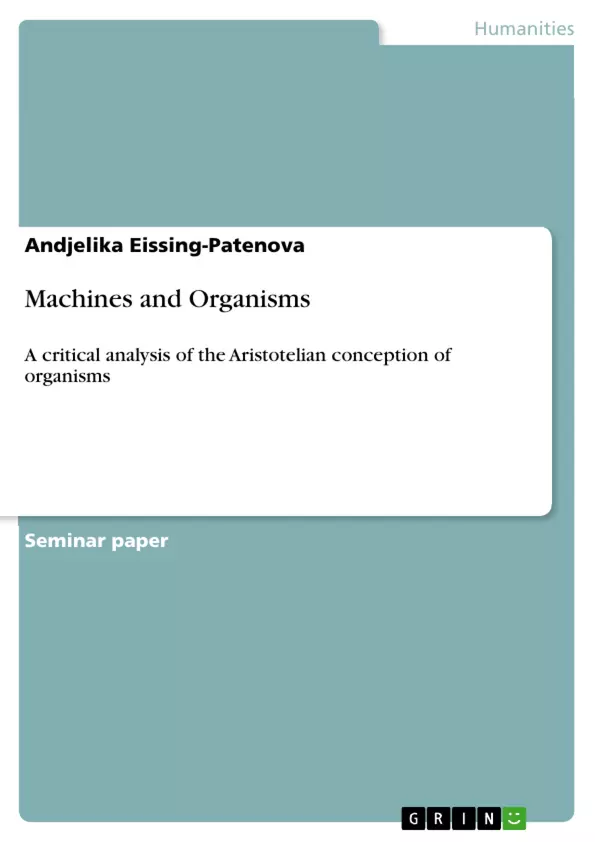Technological developments of artificial intelligence paired with incredibly realistic simulations of organic bodies will probably make machines hardly differentiable from living beings in the near future. The increasing possibilities of replacing bodily parts by robotic replications do not simplify a strict division between organisms and machines. Therefore, it is relevant to think about the question whether modern machines can be subsumed under well-known concepts of organisms. And if they do, can we accept that? Or should such concepts be rethought and updated?
In her paper "Organismus - Maschine: Analogie oder Gegensatz", Marianne Schark compares the Aristotelian and the Cartesian conception of organisms. According to the Aristotelian conception, living beings consist of a physical body (matter) and a soul (form), which is necessary for viability. According to Aristoteles, the organic body functions as the soul’s tool. Supporters of the Cartesian conception criticize this theory by claiming that animals are nothing more than organized bodies and thus do not differ from machines. In general, those two conceptions vary regarding their interpretations of the nature of abilities: While, according to Aristoteles, living beings possess active abilities, René Descartes rather considers them as merely having passive dispositions.
Since it seems obvious that modern machines can be considered as organisms according to the Cartesian conception, in this paper, I will focus on the more ambiguous Aristotelian conception. I argue for the claim that modern machines can be considered as organisms even according to the Aristotelian conception of organisms. If this is true, we should seriously think about which distinctive features still differentiate organisms from modern machines and consequently, whether an introduction of new theoretical approaches of organisms is required.
Inhaltsverzeichnis (Table of Contents)
- I. INTRODUCTION
- II. MAIN ARGUMENT AND OUTLINE
- III. THE ARISTOTELIAN CONCEPTION OF ORGANISMS
- The soul as the form of living beings
- The organic body as the soul's tool
- First interpretation
- Second interpretation
- IV. STATEMENT
- V. CONCLUSIONS
Zielsetzung und Themenschwerpunkte (Objectives and Key Themes)
This paper explores the question of whether modern machines can be considered organisms according to the Aristotelian conception. It argues that machines can fulfill the conditions of this conception, prompting a reevaluation of the definition of "organism" and its distinction from machines.
- Aristotelian conception of organisms
- Modern machines as organisms
- Role of the soul in Aristotelian thought
- The organic body as a tool
- Distinctive features of organisms
Zusammenfassung der Kapitel (Chapter Summaries)
The introduction outlines the increasing blurring of the lines between organisms and machines due to advancements in artificial intelligence and robotics. It emphasizes the need to reconsider the concept of organisms in light of these developments, focusing on the Aristotelian conception as a point of reference.
The paper presents a clear argument that modern machines can be considered organisms according to the Aristotelian framework. It justifies this claim by analyzing the two key components of the Aristotelian conception: the soul as the form of living beings and the organic body as the soul's tool. The analysis of the soul concept explores its potential for encompassing various forms of operation, including those associated with modern machines.
Schlüsselwörter (Keywords)
This paper explores the concepts of organisms and machines, analyzing the Aristotelian conception of organisms, the role of the soul, and the potential for modern machines to be considered organisms within this framework. It delves into the implications of this reinterpretation for our understanding of living beings and the distinguishing features of organisms in the face of technological advancements.
Frequently Asked Questions
What is the Aristotelian conception of organisms?
According to Aristotle, living beings consist of a physical body (matter) and a soul (form). The soul is essential for life, and the organic body acts as a tool for the soul.
How does the Cartesian view of animals differ from the Aristotelian view?
René Descartes viewed animals as organized bodies or biological machines without souls, whereas Aristotle believed the soul was the defining form of any living organism.
Can modern machines be considered organisms?
The paper argues that with advancements in AI and robotics, modern machines can fulfill the criteria of an organism even under the ambiguous Aristotelian framework.
What role does artificial intelligence play in this debate?
AI enables machines to simulate organic behaviors and decision-making, blurring the lines between technological constructs and living beings.
Why is it necessary to rethink the concept of "organism"?
As robotic replications replace body parts and machines become indistinguishable from organic life, traditional definitions may no longer be sufficient to categorize life versus technology.
- Citar trabajo
- Andjelika Eissing-Patenova (Autor), 2019, Machines and Organisms, Múnich, GRIN Verlag, https://www.grin.com/document/469709



